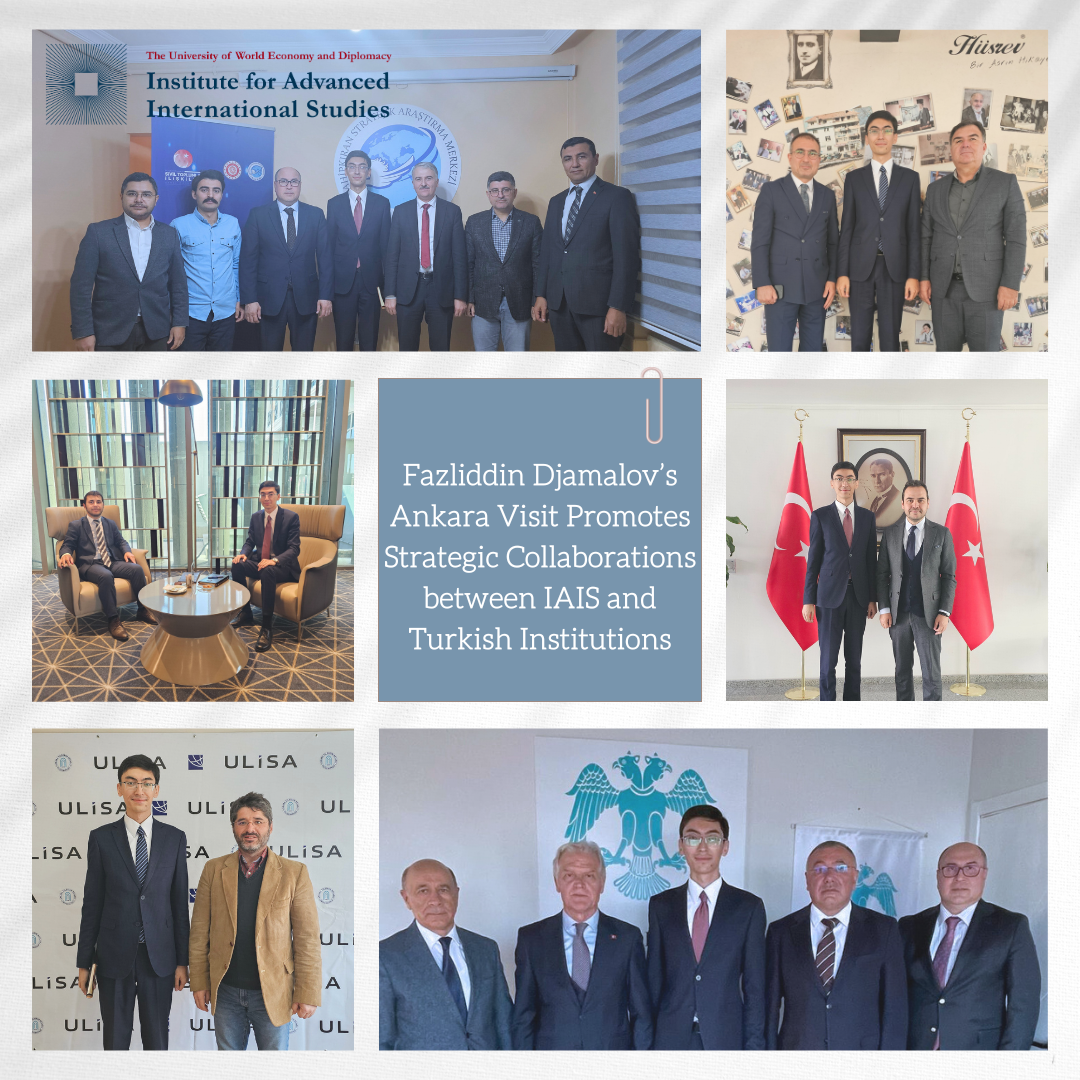
During a recent scientific visit to Ankara, Türkiye, Fazliddin Djamalov, Senior Research Fellow at IAIS, engaged in several key meetings with prominent Turkish institutions to foster bilateral research collaborations. This visit laid the groundwork for partnerships in research, publication, and strategic dialogue on issues impacting the Turkic and Central Asian regions.
On November 4, Mr. Djamalov held a working meetings with Hikmet Eren, Chairman of the Board of Trustees of the EkoAvrasya Foundation, and Kemal Kurtuz, Chairman of the Board of Directors. The discussions highlighted mutual interests in publishing articles focused on the Organisation of Turkic States (OTS) and bilateral relations, with commitments to contribute scholarly works to each other’s journals. Mr. Kurtuz also expressed eagerness to meet with the IAIS and UWED leadership during his upcoming visit to Uzbekistan.
That same day, he met with Professor İbrahim Demir, Director of the Institute of International Relations and Strategic Studies (ULİSA) at Ankara Yıldırım Beyazıt University. He outlined ULİSA’s initiative to form an economic potential platform for OTS, aimed at advancing economic and trade studies with Central Asian and South Caucasus experts. In support of further engagement, the two agreed to an online lecture by Mr. Djamalov on “Dynamics of Regional Relations: Central Asia’s Search for New Opportunities” to be hosted by Ankara Yıldırım Beyazıt University, where he presented an insightful analysis on Central Asia’s multifaceted foreign policy. He proposed a fourth, counterbalancing vector in Central Asia’s foreign relations, suggesting that regional powers such as Turkey, Iran, and Azerbaijan could diversify Central Asia’s economic and cultural networks, providing alternatives to the influences of Western, Russian, and Chinese interests.
On November 5, Fazliddin Djamalov held discussions with Turhan Dilmac, Head of the Strategic Research Centre (SAM) of the Turkish Ministry of Foreign Affairs, covering the potential of Turkey as a mediator in the Russia-Ukraine conflict and the development of OTS relations. Both parties affirmed interest in joint research projects and agreed to publish articles by IAIS and UWED experts in SAM’s journal Perceptions, signalling a commitment to sustained knowledge exchange.
Another significant engagement took place with Guray Alpar, Director of the Institute of Geopolitical Forecasts (GFI), where Mr. Djamalov explored the OTS’s potential as a regional integration body, especially amidst growing geopolitical tensions. Mr. Alpar emphasized the strategic relevance of a unified Central Asian approach in foreign policy, notably regarding major infrastructural projects like the Koshtepa Canal. Both parties committed to the concept of establishing a “Turkic School of International Relations” to further collaboration in academia.
His visit continued with a meeting with Suleyman Erdem, Director of the Sahipkiran Centre for Strategic Studies, who emphasized the importance of connectivity projects like the Middle Corridor. Erdem underscored the need for stronger security measures to ensure smooth trade flows along these routes and suggested that further discussions continue digitally. He also invited IAIS and UWED to participate in the 2025 International Conference on Strategic Risks and expressed interest in a future Memorandum of Understanding to formalize collaborative activities.
The final meeting took place with Yunus Emre Kanat, Director of the Association for Strategic Studies and Development (SAGEDER), who proposed joint grant projects focusing on energy and sustainable development, further underscoring the commitment to tackling regional energy challenges collaboratively.
In conclusion, Fazliddin Djamalov’s visit signifies an important step in strengthening Uzbekistan’s ties with Turkish academic and policy institutions. The engagements facilitated by the Uzbek Embassy in Turkey were instrumental in paving the way for deepened research collaborations and strategic partnerships. These outcomes promise long-lasting impacts on regional stability and prosperity, aligning with IAIS and UWED’s mission to advance scholarly and policy-oriented dialogues across Central Asia and beyond.